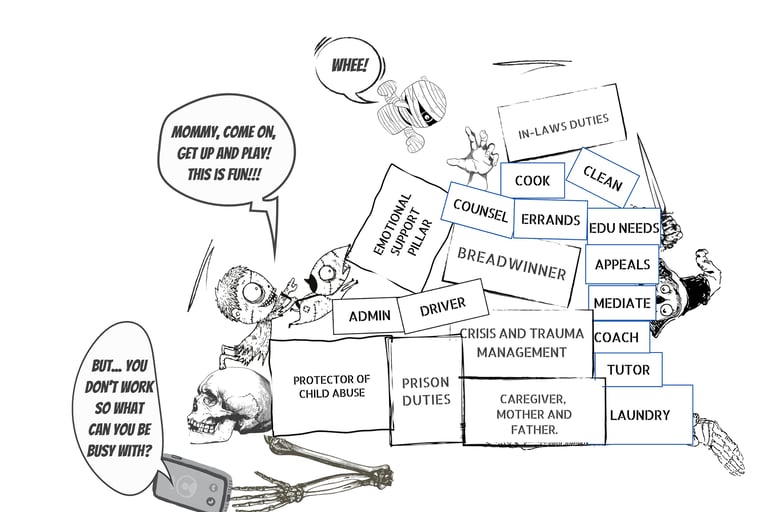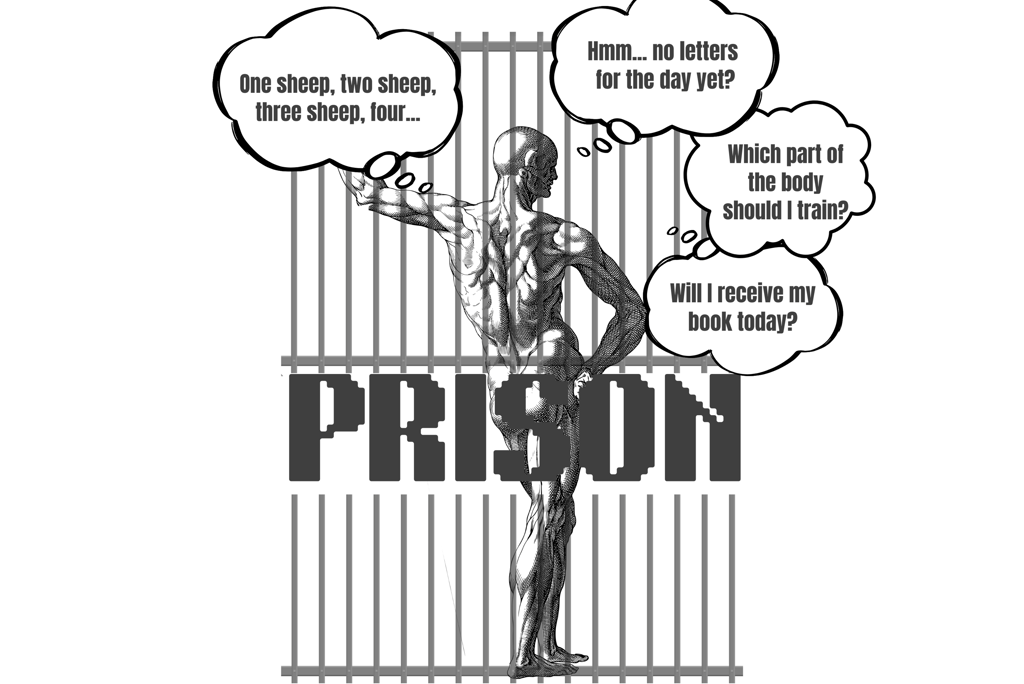Offenders and their families face overwhelming odds against the criminal justice system.
Family members often suffer in silence, for fear of disclosing their familial ties with an offender
Exorbitant criminal defence fees, exponentially higher for trials.
Families of offenders pay the price when it's not their crime.
Families of offenders encounter sudden shocking change. This is more damaging where children are involved. The fear and uncertainty can be overwhelming when their parent is taken away in their presence. triggering mental and emotional turmoil that will persist over a long period of time.
The period of separation and not hearing from the family member, increases the mental and emotional turmoil. Again, children are more affected.
Criminal conviction leads to career dissolution and void of academic achievements, eroding past efforts and affect state of finances.
Police arrest.
Affording a lawyer puts a toil on the family's finances. They suffer from the impact of financial lack.
Period of financial difficulties is indefinite.
Forced and extended separation
Loss of financial support.
Loss of contribution to household duties and responsibilities.
Long periods of idleness and boredom.
Loss of freedom in almost all aspects results in reliance on family members to provide (because the prison system does not), which includes visitation and communication.
Families face loss of income contribution, further straining their finances.
Disruption in distribution and fulfilment of household duties. Family members take on the work of their incarcerated kin, With an increase in burdens, they compromise on their own duties and responsibilities, and face significant repercussions when they are academic and work-related.
Again, children are the most vulnerable.
Minimal help options available. Financial aid is challenging to get and even if approved, amount is meagre. Their cluelessness causes retraumatisation.
Post release,
Traumatised, requires time to reintegrate into society and depends on family for support.
Cessation of contribution to household duties and responsibilities.
Prolonged separation to family members have eroded relationships that require much effort to mend.
Traumatised family members have to uplift ex-offender kin when they are in crisis too.
Family members fulfil requests, again piling onto their own duties,
Prison visitation occurs twice a month. For certain clusters, they are fixed on weekdays office hours, clashing with working and studying family members.
Family members rush to meet timing, predisposing them to accidents along the way. They face increase in transportation cost due to need for hired vehicles, which is concerning due to their financial state.
Financial Losses
Psycho-emotional Wear Down
Police remand.
Pre-Conviction
Sentence of Imprisonment.
Children suffer greatly from forced and extended separation from parents / caregivers in prison. The basic foundation in life is harmed.
Concurrently they experience caregiver replacement, possible housing displacement, separation from co-borns and such further adding to the distress.
Younger children are particularly vulnerable not just because of their dependence on the parent but their inability to express their concerns and get an understanding of the events to achieve comfort. Development of the personality is significantly impaired.
The negative repercussions of disrupted attachment are long term and produce a whole other set of negative outcomes. Children experience emotional health challenges and tend towards maladaptive management. Some times this lands them in the arms of the law, giving rise to a destructive cycle that often go on way into adulthood.
Prison visitation is not just crucial for the kin's wellbeing but a show of family support that preferences them for the offender's early release.
Children with parents / caregivers in remand and prison suffer disrupted attachments that have lifelong negative impacts.
With greatly restricted communication between inmates and family members, achieving family cohesion is a struggle.
Marital relationships are strained, leaving the spouse of the offender feeling unsupported, left to managing the family on his/her own.
Much harm is done when children have their parents imprisoned, even worse when they are the main caregivers. They experience abandonment trauma with serious lifelong consequences.
Families of offenders suffer from financial lack that grows as time progresses.
They assume more financial responsibility for the family's needs such as paying legal fees for the offender and acquiring an income. This goes on indefinitely.
However, financially sustaining the family is greatly undermined when fulfilling the obligations pertaining to inmate's wellbeing and the increased burdens with the major load of responsibilities resting on them.
Yet support for these families is abysmal. There are not many programs that address the needs of these families. In fact welfare agencies are hesitant to lend a hand.
The lack of resources and knowledge of often exacerbate the challenges faced by these families. isolation and helplessness.
There are 3 stages that an offender will traverse when contacting the criminal justice system. From the point of arrest or police investigation up to the end of the prison sentence.
All 3 stages deplete the offender financially; criminal defence expenditure in the pre-trial stage, loss of income in the imprisonment stage and stagnant, low income in the post-release stage.
3 Stages in trajectory of an offender.
A series of paradoxes
Often times, those accused are simply unable to hire a lawyer. Alternative means to do so come with their limitations and some choose to do without. In most cases, these methods negatively impact the outcome of their criminal case.
There is no closure for the family members of the offender when he is convicted and sentenced, particularly where a prison term is imposed. The challenges have merely become a different kind.
Families of Offenders Pay The Price When It's Not Their Crime.
The forced and extended separation due the sentence of imprisonment impacts not only the inmate but the family members. For most of us, weeks away from those we have emotional ties with can be unbearable, what more months, years or decades of time away?
It is particularly debilitating for children whose parents are imprisoned. even worse when the parent is the main caregiver.
Children are unable to adequately cope with the shocking changes and tend towards maladaptive ways to manage it, giving rise to mental health challenges and substance addiction, bringing about another set of negative repercussions.
STAGE 2.0
THE PUNISHMENT.
Opposition Within The Family
Broken Attachments
Adults have to step in to guide children in handling these life-changing events, and address the emotional trauma which is a constant process, even while in a distraught state themselves.
Often these adults are the children's remaining parent or grandparents.
However it is not a sure thing that any of them will do so, as emotional awareness is not a common trait, much less in our reserved asian society.
It is not uncommon to find disagreeing factions within such family settings. Those who disapprove of the offender may express their disagreement towards those perceived to be supporting the offender. Such situations can result in arguments. This causes more disturbance to children when they are involved and carry long term repercussions.


STAGE 2.0 THE PUNISHMENT.
Every year nearly 10,000 families experience a kin's admission into prison. Over the years that the prison has been in operation, these families make for a substantial portion of the population.
How many of them do you know? There's a good chance you don't.
Families of offenders tend to conceal this aspect of their lives for fear of the stigma, which is especially heavy in an asian culture, as it adds onto the challenges they are already burdened with.
Families of offenders are also invisible to the justice system that has made thbecoming the collateral damage of custodial sentences. Imprisonment is a severe condition that affects not just offenders but their closed ones and in life-changing ways.
When efforts to address this problem has been lacklustre, rehabilitation of offenders is greatly undermined. Fire cannot be curbed with more fire in the environment, because of how much the lives of those within a family intertwine and their close proximity under one roof.
Intergenerational offending.
When a person is put behind bars, the family is denied of his contribution while burdened with his duties. It can result in the load of the work falling on the remaining able ones, which may be just the spouse or parents.
It can be overwhelming and often not possible to manage, thus children and elderly folks step in. They are often dependents but have to take on roles and responsibilities now.
Not suited for the tasks, not only will they be unsatisfactorily completed, it impedes on their ability to attend to their own responsibilities.
For instance, a child who has to care for his younger siblings will not be able to focus on his education, giving rise to a disadvantage in his future endeavours.
Lack of cooperation amongst opposing factions within the family obstruct task completion, undermining the efforts of those who are doing their part.
Opposition Within The Family
Disproportionate allocation of burdens.
Finances are often impacted especially when the breadwinner is incarcerated. The family now has to find a way to sustain. The spouse or elderly parents will have to work but it is not that easy to do so. With young children, when the parent is unable to care for and supervise them, they are vulnerable to mishaps, reduced dietary options affecting growth and development, and even emotional trauma because now, both parents are not there for them.
This distancing from parents impact older children who become more susceptible to peer influence as they look outside of family for acceptance.
The implications are signifiant. As family members most often meet difficulties in fulfilling these roles and responsibilities. the family suffer from a lack in critical areas. The hardest hit are the vulnerable ones.
If the inmate has not been a contributor to the household, then the family members would've already been burdened with extra load of work prior to the imprisonment.




Families of Offenders Pay The Price When It's Not Their Crime.
Within a household, family members have roles and responsibilities such as doing housework, cooking, caregiving, childminding and breadwinning. Young children, elderly folks or anyone with chronic health problems increase the workload of the able family members.
Contact with the world on the other side of prison walls is crucial for inmate's wellbeing and largely restricted to immediate family, who inevitably carry the bulk of supporting the inmate's psycho-emotional wellbeing. Doing so under prison's terms comes at their expense.
Visitation of inmates occur twice a month, during working hours. Although the actual meeting last 20 - 25 mins, the entire process including traveling, registration, body checks and so on, takes up half a work day.
For some prison clusters, visitation is fixed on a specific weekday.
Family members will have to do this for the duration of the prison term, whether it is months, years or decades. If they are working, will this jeopardise their employment. Will their employers and colleagues show empathy and accommodate?
Family members who are taking over the role of financial provider after their kin is imprisoned will find it even more challenging as they'll have to get a job that can accommodate this arrangement.
Held Responsible For Inmate's Release Terms.
Risk Of Mishaps.
Fulfilling these according to the prison's strict terms and conditions affect their lives yet not doing has negative impacts on their kin's favourable release terms.
Filed up visitation slots are perceived by the prison to reflect familial support and so does high frequency of mail received by the inmate from his/her family. These go toward considering the inmate for programs that enabled part of their sentence to be completed outside of prison at an earlier date, which is .
Likewise the number of letters received by inmates is another way to gauge familial support.
Although the latest arrival time is 30 mins prior to actual meeting, if registration time period results in this time frame, which is determined by the prison admin and number in the queue, family members are still denied entry.
Children who can only visit after school dismissal which is around 1330 to 1345 hrs, risk being denied entry even for the latest visit time slot at Changi Prison, where registration must be completed by 1430 hrs. They need to rush to prevent that puts them at risk of traffic accidents.
While the purpose of restrictions placed on the inmate is to punish, yet fostering a disconnect increases his/her propensity for future offending. This scenario in particular replicates the same conditions prior to the kin's run in with the law. Most likely the inmate's family members would've have prior to the incarceration repeatedly attempted to engage the inmate but received minimal response who was withdrawing as he went on his own path towards crime.
Now that the inmate is free from distractions and given to deeper reflection, they face restrictions from penning their thoughts to convey with family members who can benefit from insights into his nature.
Another irony is the burdening of family members to write frequently when they are already under the weight of increased workload due to their kin's absence as opposed to the inmate's plentiful time. has plenty of time on his/hand.